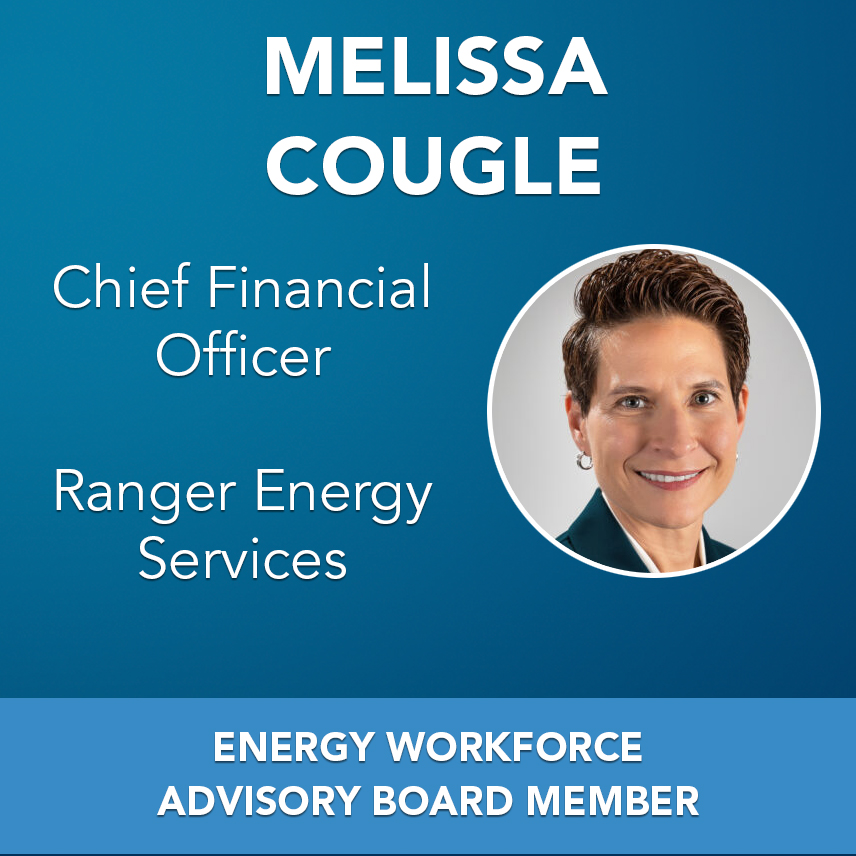Melissa Cougle is Chief Financial Officer for Ranger Energy Services and a member of the Energy Workforce Advisory Board. She recently shared her thoughts on women in oil and gas.
Energy Workforce: Why did you get involved in oil and gas?
Melissa Cougle: As a native of Southern Louisiana, oil and gas has been part of my “DNA” almost since birth. My college education was largely paid for through the proceeds from a portion of a gas well on my grandparent’s farmland. My parents were not college educated and their perception of success was formed around the affluence made possible from the petroleum industry. When I first went to university, I did not anticipate a career in oil and gas, but as the next few years would unfold and opportunities took me to Houston, it was a natural fit for me to gravitate to the energy industry, broadly speaking. The majority of my clients were energy focused when I first started out of college in the financial services industry and eventually joining one of my clients just felt like the right next step.
EW: What are the major changes you’ve seen during your time in the industry?
MC: When I first started in this industry in 2002, it was in an offshore boom as the shale revolution did not really begin for another six years. My career started as a consultant for an offshore drilling contractor. I was fascinated by the international and global reach of the organization and, as someone from a coastal community, the technology that allowed for drilling in offshore waters.
Back then, keeping employees safe globally even when onshore in international jurisdictions, was a herculean task. In my early travels to visit shore bases globally, there was frequently a lack of reliable electricity, warm water for a shower and internet connections to complete your work. In more recent years, as I visit many of those same locations, the amount of development in these communities is nothing short of astounding. Cities have infrastructure, hotels have been built and the safety profile is greatly improved. Many of these cities have been able to grow so dramatically with the support of the oil and gas industry, which has been really encouraging to me as a long-standing industry employee.
EW: What do you think companies could do to retain female employees?
MC: It can be isolating and lonely to be a female in this industry, and you can frequently feel somewhat singled out, both in good and bad ways. When I reflect on my best experiences as a female in the industry, those experiences were rich and rewarding because my contribution was valued, and my views appreciated. In terms of retaining more diversity, companies should be looking to foster a culture of appreciating differing views and voices. Diversity is most valuable when it can broaden a perspective and avoid a tendency to fall into “group think.” That said, companies can sometimes be dismissive toward diverse employees since their input can seem isolated or one-off. When leaders go out of their way to foster consideration around the differing views at the table, not only do these companies generally benefit from better overall decision making, but they also foster the type of culture that makes diverse employees feel valued.
EW: Do you have a mentor, and if so, how has mentorship helped you towards your career goals?
MC: Even over 20 years into my career, I still actively seek opportunities for mentorship. Presently, I can think of at least three or four people, both women and men, that I think of as mentors. I have sought out mentors who demonstrate skills and competencies that are different than my own so that I can learn in new and different ways, and that applies for both technical competencies and in softer skill areas. Your mentors should not be thought of as people who can get you promoted or open specific doors for you. A good mentor is a person who is willing to be a thought partner and challenger to give you new perspective and push you to continuously grow. My final thought here is that people should not necessarily think only someone who is more successful than them can be a good mentor. Focus on seeking out people that you have a strong connection that are willing to foster your growth and bring new perspectives to you. Sometimes these are peers, and as you progress in your career they may eventually be subordinates.
EW: What advice would you give women thinking about a career in oil and gas?
MC: My advice would be to go into a career with appropriate expectations. Although the industry is far more supportive than it was when I began, women are still working to find their voices at companies and, at times, you will likely be frustrated and feel as though progress is moving backwards. That said, it is essential for women to be willing to carry the torch into the future to continue pushing for positive change and inclusivity for diverse employees. Changing culture and mindset is challenging and slow moving at times, but nothing is more rewarding when you reflect on your contribution, and it should never be underestimated the impact one person can have.
Click here to subscribe to the Energy Workforce newsletter, which highlights sector-specific issues, best practices, activities and more.





